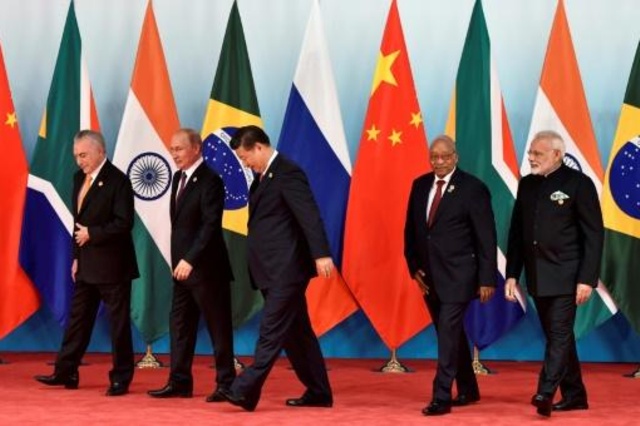The Political Implications of Saudi Arabia, Iran, UAE, and Egypt Joining BRICS

Prepared by the researcher : Ahmed Azzam Hassan – Researcher in political affairs and international relations
Democratic Arabic Center
This article examines the potential political implications of Saudi Arabia, Iran, UAE, and Egypt joining BRICS (Brazil, Russia, India, China, and South Africa). It analyzes the historical rivalries, regional dynamics, and geopolitical considerations that could shape the political dimension of these countries’ participation in BRICS. The analysis draws on various scholarly articles that discuss the political dynamics of the Middle East, the role of regional powers, and the impact of alliances and rivalries. The findings suggest that the inclusion of these countries in BRICS could have significant implications for the Middle East and the global balance of power.
- Introduction
the realm of international politics is witnessing a potential seismic shift with the prospect of Saudi Arabia, Iran, the United Arab Emirates, and Egypt joining the BRICS group. this move has ignited discussions about the political ramifications and its influence on the Middle East and beyond. this article delves into the multifaceted political dimension of these nations’ entry into BRICS.
- Saudi Arabia and Iran Rivalry
The rivalry between Saudi Arabia and Iran is a central factor in the political dynamics of the Middle East. Both countries compete for regional hegemony and have engaged in proxy conflicts and power struggles. The inclusion of Saudi Arabia and Iran in BRICS could potentially exacerbate these tensions and further polarize the region. The ideological and sectarian differences between these two countries add another layer of complexity to their rivalry.
- UAE and Egypt’s Relations with Saudi Arabia and Iran
The UAE has been a key ally of Saudi Arabia and has supported its efforts to counter Iranian influence in the region (Mugurtay & Müftüler-Baç, 2022). The inclusion of the UAE in BRICS could strengthen its position as a regional power and provide it with additional leverage in its competition with Iran. Egypt, on the other hand, has had a complex relationship with both Saudi Arabia and Iran. The rise of the Muslim Brotherhood strained its relations with Saudi Arabia and the UAE (Ibrahim, 2021). The inclusion of Egypt in BRICS could potentially provide it with alternative sources of economic and political support, reducing its dependence on Saudi Arabia and the UAE.
- Implications for the Middle East
The political implications of Saudi Arabia, Iran, UAE, and Egypt joining BRICS would have far-reaching implications for the Middle East. It could potentially reshape alliances, power dynamics, and regional rivalries. The inclusion of these countries in BRICS could lead to a realignment of political forces in the region and impact ongoing conflicts and proxy wars (Beck & Richter, 2020). The involvement of BRICS in Middle Eastern affairs could also influence the resolution of regional disputes and shape the future trajectory of the region.
- Global Balance of Power
The addition of Saudi Arabia, Iran, UAE, and Egypt to BRICS would also have implications for the global balance of power. BRICS is already seen as a counterbalance to Western dominance, and the inclusion of these Middle Eastern countries would further strengthen its position as a global power bloc. It could potentially challenge the existing international order and reshape global governance structures. The political influence of these countries, combined with the economic and military capabilities of BRICS, could have significant implications for global politics.
- Reshaping Global Dynamics:
The inclusion of Saudi Arabia, Iran, UAE, and Egypt into BRICS (Brazil, Russia, India, China, and South Africa) signifies a significant realignment of global political dynamics. These Middle Eastern nations bring diverse geopolitical perspectives, which can reshape the balance of power within the BRICS bloc and the broader international arena.
- Middle Eastern Geopolitical Challenges:
Each of these countries faces its unique set of regional challenges, ranging from security concerns to complex conflicts. Their membership in BRICS opens avenues for collaboration on addressing shared regional issues, as well as the potential to bring BRICS’ influence to bear on regional crises.
- Economic Opportunities and Diversification:
Joining BRICS could offer economic diversification opportunities for these nations, especially considering their heavy reliance on oil exports. By engaging with the economies of BRICS countries, they can explore avenues for economic growth, trade expansion, and investment diversification.
- Influence on Global Organizations:
The political clout of Saudi Arabia, Iran, UAE, and Egypt, combined with the collective strength of BRICS, could impact the functioning and decision-making processes of global organizations such as the United Nations, the World Trade Organization, and others. Their collaboration could shape policies on key global issues, reflecting a multipolar approach to international affairs.
- Regional Stability and Conflict Resolution:
BRICS membership could potentially provide a platform for dialogue and conflict resolution in the Middle East. Saudi Arabia, Iran, UAE, and Egypt might use their positions to facilitate diplomatic initiatives, contributing to regional stability and peace.
- Challenges of Divergent Interests:
While the inclusion of these nations presents opportunities, it also brings challenges due to differing geopolitical priorities. Balancing the interests of Middle Eastern countries with those of the existing BRICS members may require careful diplomacy and negotiation.
Conclusion:
The prospective entry of Saudi Arabia, Iran, UAE, and Egypt into BRICS carries profound political implications. The dynamic interplay between the interests of these Middle Eastern countries and the established BRICS members will shape the group’s future trajectory. As these nations navigate the complex world of international politics within BRICS, they have the potential to redefine global diplomacy and cooperation in an increasingly multipolar world.
In conclusion, the political implications of Saudi Arabia, Iran, UAE, and Egypt joining BRICS would have profound implications for the Middle East and the global balance of power. The inclusion of these countries in BRICS could reshape regional alliances, exacerbate existing rivalries, and impact ongoing conflicts. It could also challenge the existing international order and shape the future trajectory of global politics. Further research and analysis are needed to fully understand the potential consequences of this development.
References:
- Adisonmez, U., Onursal, R., & Oztig, L. (2022). Quest for regional hegemony: the politics of ontological insecurity in the saudi–iran rivalry. Alternatives Global Local Political, 48(1), 91-107. https://doi.org/10.1177/03043754221138186
- Ali, A. (2020). Saudi iranian rivalry: the struggle for power and influence in the middle east. Pakistan Social Sciences Review, 4(III), 587-598. https://doi.org/10.35484/pssr.2020(4-iii)42
- Beck, M. and Richter, T. (2020). Fluctuating regional (dis‐)order in the post‐arab uprising middle east. Global Policy, 11(1), 68-74. https://doi.org/10.1111/1758-5899.12797
- Ibrahim, S. (2021). Intra-regional alignment strategy of small states in gulf area: cases of qatar and united arab emirates (uae). International Journal of Interdisciplinary and Strategic Studies, 2(1), 115-121. https://doi.org/10.47548/ijistra.2021.31
- Mugurtay, N. and Müftüler-Baç, M. (2022). Turkish power contestation with the united arab emirates: an empirical assessment of official development assistance. International Politics. https://doi.org/10.1057/s41311-022-00422-8
- Mugurtay, N. and Müftüler-Baç, M. (2022). Turkish power contestation with the united arab emirates: an empirical assessment of official development assistance. International Politics. https://doi.org/10.1057/s41311-022-00422-8
- Oztig, L. (2021). Regional dynamics and the future of middle east strategic alliance. Digest of Middle East Studies, 30(2), 102-115. https://doi.org/10.1111/dome.12229




